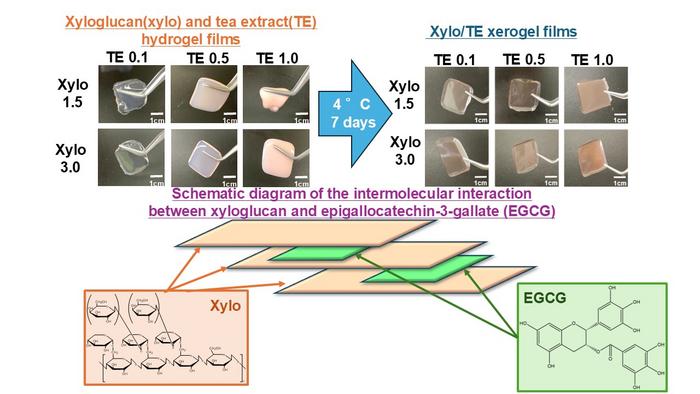
Green tea has long been celebrated for its numerous health benefits, particularly due to its high concentration of catechins, which belong to a class of antioxidants that work against oxidative stress within the body. These compounds play a crucial role in protecting cellular structures, especially during cancer treatments that often generate harmful free radicals. One particularly troubling side effect of such treatments is oral mucositis, an inflammatory condition affecting the mouth’s lining, which can cause significant pain and disrupt essential activities like eating and speaking.
Researchers from the Tokyo University of Science (TUS) have taken a significant step towards mitigating the discomfort associated with oral mucositis by developing a revolutionary film utilizing the beneficial properties of green tea catechins. The innovative method developed by Professor Takehisa Hanawa’s research team aims to create a user-friendly treatment alternative that not only maximizes comfort but also supports the broader goals set forth by the United Nations Sustainable Development Goals—specifically, good health and well-being.
Their research was made public online on January 14, 2025, and later published in the journal ACS Omega. The collaborative effort involved various researchers from TUS, including Assistant Professor Kaoru Hirose and other prominent scientists from MP Gokyo Food & Chemical Co., Ltd. This multifaceted team united to address the growing need for accessible formulations that could improve the quality of life for cancer patients dealing with the painful side effects of their treatments.
Oral mucositis is a condition that plagues about 30 to 40 percent of cancer patients undergoing chemotherapy or radiation therapy. It results from the damage inflicted on rapidly dividing cells that make up the mucosal lining of the mouth, leading to agonizing lesions that necessitate urgent relief. With their thin, mucoadhesive film, the researchers aim to introduce a simple yet effective solution for delivering active ingredients such as medications directly to the affected areas, promising a new level of convenience.
The formulation combines xyloglucan—an edible, water-soluble polymer derived from tamarind seeds—with high-concentration green tea extract rich in catechins, including a significant percentage of epigallocatechin gallate (EGCG). This natural gelling agent mimics the mucin network in the oral cavity, creating an adhesive layer that remains tightly bound to the mucosal surface. Not only does this enhance the film’s mucoadhesive properties, but the choice of green tea extract also opens avenues for health benefits associated with its potent anti-inflammatory activity.
The researchers meticulously prepared two distinct types of films: hydrogels and xerogels. Hydrogels retain a liquid-like quality at body temperature, making them less effective in providing extended adhesion. In contrast, the xerogel, which undergoes a drying period of seven days, exhibits substantial strength and resistance to detachment. These properties make it highly suitable for prolonged application in oral situations where durability is essential.
To determine how well their films would adhere within the oral environment, the scientists subjected the xerogels to rigorous testing. Simulating the conditions of the mouth with mucin disks and artificial saliva, they measured the forces required to detach the films from the disks. Impressively, their results demonstrated that the films adhered as effectively—or more so—than many commercially available mucoadhesive products currently on the market.
Their studies also revealed that the films could steadily release EGCG when soaked in water. They observed that films containing higher concentrations of xyloglucan exhibited improved release rates, paving the way for the potential therapeutic application that could prolong patient comfort and reduce undesirable symptoms associated with oral mucositis.
In addition to their strong adhesive properties, the models developed by Hanawa’s team also possessed hydrogel-like characteristics, promoting rapid water absorption, an essential trait when considering the film’s performance in moist oral environments. According to Professor Hanawa, the combined strengths of these films offer a unique advantage, enabling not only efficient adhesion but also the ability to release beneficial compounds gradually—the perfect combination for treating delicate oral tissues.
While the team is optimistic about the promise of their findings, they are not resting on their laurels. The next steps involve deepening their understanding of the film’s safety and efficacy through meticulous cell-based experiments. They recognize that rigorous testing will be vital as they strive to push this novel solution forward, aiming ultimately to enhance the standard of care in oncology.
Throughout this ambitious project, the Tokyo University of Science remains aligned with its mission to foster innovation that supports sustainable health practices. The collaborative spirit seen in this study highlights the importance of interdisciplinary teamwork in scientific exploration, demonstrating the potential good that can come when diverse talents unite toward a common goal.
As the study progresses, there is a palpable sense of hope that the thin film developed from this collaboration can significantly alter how oral mucositis is managed and treated. With the ongoing efforts of scientists and researchers dedicated to perfecting this approach, patients may soon experience a viable treatment option that can enhance their quality of life as they navigate the often painful effects of cancer therapy.
The results from the Tokyo University of Science’s innovative study open up new pathways in the realm of pharmaceutical applications and paves the way toward practical solutions that improve patient experiences during a challenging chapter of their medical journeys. With ongoing research and potential trials on the horizon, this pioneering work serves as a promising beacon of hope for those confronting the harsh realities of cancer treatment and oral mucositis.
Subject of Research: Development of mucoadhesive films for oral mucositis treatment using green tea extract.
Article Title: Preparing and Characterizing of Xyloglucan Films Containing Tea Extract for Oral Mucositis
News Publication Date: 14-Jan-2025
Web References:
References:
Image Credits:
Keywords: Oral mucositis, Green tea catechins, Xyloglucan, Mucoadhesive films, Cancer treatment, Antioxidants, Therapeutic applications, Pharmaceutical development, Quality of life, Interdisciplinary research, Patient-friendly formulations, Sustainable health practices.





